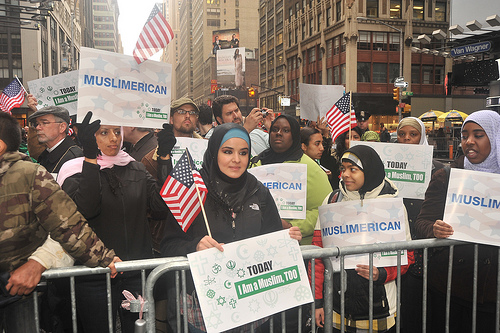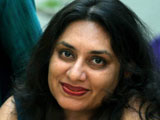Islamophobia, Inc.
by Bina Shah / March 19, 2013 / No comments
In the West Islamophobia is more than prejudice: It’s also a money-making machine.

At an inter-faith protest in Times Square in March 2011, Muslims gather against Islamophobia to work toward religious equality. Photo: User asterix611 on Flickr.
This month I was reading Professor Akbar S. Ahmed’s latest book, The Thistle and the Drone, which addresses Obama’s drone war on the tribal areas of northern Pakistan, Yemen, Somalia, and the Kurdish areas of Iraq. As I was reading, one section in particular jumped out at me. It was about how this drone war has fractured tribal societies, groups that Ahmed calls the cornerstones of human civilization.

- Pakistan is a country of contradictions – full of promise for growth, modernity and progress, yet shrouded by political, social and cultural issues that undermine its quest for identity and integrity. My bi-monthly column “Pakistan Unveiled” presents stories that showcase the Pakistani struggle for freedom of expression, an end to censorship, and a more open and balanced society.

- Bina Shah is a Karachi-based journalist and fiction writer and has taught writing at the university level. She is the author of four novels and two collections of short stories. She is a columnist for two major English-language newspapers in Pakistan, The Dawn and The Express Tribune, and she has contributed to international newspapers including The Independent, The Guardian, and The International Herald Tribune. She is an alumnus of the International Writers Workshop (IWP 2011).
Additionally, Ahmed writes how after 9/11, a whole crop of so-called “experts” on Islam popped up, charged with explaining topics such as Islam, the Middle East, and Arabs’ and Muslims’ seemingly incomprehensible hatred of Western values, to the Western world. Ahmed quotes Touqir Hussein, a former Pakistani Ambassador to the United States, who described these experts as “a new nexus…consisting of academia, journalists, the media and think tank community, advocacy groups, lobbyists and consultants that has become a powerful adjunct to…policy-making.”
What’s the motivation for this sudden proliferation of experts? Altruism? A need to understand a different culture? A quest for truth? Sadly, none of these: The answer is money. Hussein said, “Almost 80 percent of academics have sold their soul to this new cult as this is leading them to write ‘best-sellers’ and make fabulous money as consultants. That is why Afghanistan and Pakistan have been messed up and the government does not even realize it.” It’s this kind of “crass materialism” that provides job security: According to Hussein, as long as conflict between Islamic countries and Western powers persists, these “experts” will always have gainful employment.
In The Thistle and the Drone Ahmed also mentions the American journalist Nathan Lean, author of an alarmingly titled book, The Islamophobia Industry: How the Right Manufactures Fear of Muslims. This book is a damning indictment of a manufactured conflict that is (again) driven by money. Lean points out that amongst other right-wing media outlets and publications, Fox News—that bastion of objectivity and unbiased reporting—has been spewing lies and misconceptions about Islam’s incompatibility with American values for the last twelve years, creating what John Esposito calls “the multi-million dollar cottage industry of fear mongers and the network of funders and organizations that support and perpetuate bigotry, xenophobia, and racism”.
The reaction to Lean’s hypothesis has been predictable: In its review of the book the Wall Street Journal denied that Islamophobia even exists. In the meantime, the steam train of the Islamophobic network has been chugging along, barely dented by Lean’s book. Nor has it been stopped by “Fear, Inc,” an in-depth report from the Council on American-Islamic Relations (CAIR) that names and shames the so-called “experts.” The report shows how the “experts” hold no academic degrees nor significant job experience that should afford them any status in the field. The report also names seven organizations that have donated $40 million to Islamophobic think-tanks. Yet both CAIR and the report’s authors have been attacked and accused of supporting “jihad” in America. But it’s predictable that anyone who threatens the Islamophobia cash flow is going to get defamed and discredited in the most vicious of ways.
As if that weren’t enough, I was watching the Oscars earlier this month, and realized that the Islamophobia industry has made it to the pinnacle of popular culture. Already, popular video games like Call of Duty and Medal of Honor have been banned in Pakistan because the country is portrayed in the games as supporting Al Qaeda and other terrorist organizations. And now, Zero Dark Thirty, the film about the killing of Osama bin Laden, and Argo, the one about the Iranian hostage crisis, were both nominated for Best Picture awards, with Argo winning the Oscar. Simultaneously, Homeland, a television show about FBI agents battling Islamic sleeper cells in America, has become one of the most widely-watched programs in less than a year.
Hoping for any sort of balanced, nuanced portrayal of Muslims in this phase of popular culture is out of the question. Video games, movies, and television shows peddle the lies, misconceptions, and stereotypes about Muslims that the Islamophobia industry has propagated. Then accolades, awards, and box-office receipts are bestowed upon them by the Islamophobia industry, creating a self-perpetuating monster. Thus, I’ve decided that I won’t watch any of these movies or television shows, not even on pirated DVD, and I’ll urge anyone who will listen to do the same: We need to make a concerted effort to boycott Islamophobia in all shapes and forms in order to deprive it of the dollars it needs to thrive.




